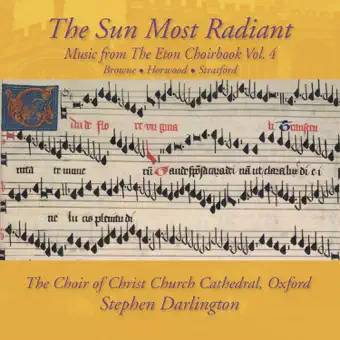november 2016
The Sun Most Radiant: Music from The Eton Choirbook Vol. 4 – Browne • Horwood • Stratford
Christ Church Cathedral Choir, Oxford o.l.v. Stephen Darlington
Het nieuwste deel in Christ Church’s verkenning van het Eton Choirbook is prachtig voorbereid en gepresenteerd, met overal uitstekend gezang.

Met deze aflevering van muziek uit het Eton Choirbook wil het Choir of Christ Church Cathedral de vijfdelige bloemlezing van The Sixteen uit de jaren negentig evenaren. Het lijkt me dat ze het nu al overtreffen op technisch vlak – wat opmerkelijk is gezien de onvermijdelijke personeelswisselingen die de tijd met zich meebrengt voor een koor met jongenssolo’s – en op interpretatief vlak. Zoals ik al opmerkte bij Vol 3 (11/14), hebben ze zich ook een weg gebaand door die stukken van Eton die nog niet eerder waren opgenomen, en de kwaliteit van hun uitvoeringen heeft mijn waardering voor verschillende ‘kleinere’ componisten ten goede veranderd.
Deel 4 is het meest bevredigende deel van de set sinds het eerste. Zelfs naar de maatstaven van eerdere afleveringen zijn de tempi van Stephen Darlington verrassend ontspannen, vooral in de tweedelige tijdsdelen. Afgaande op de klok zou je ze zelfs langzaam kunnen noemen, maar de textuurdetails zijn zo duidelijk dat de blijvende indruk er meer is van overleg dan van zwaarwichtigheid. De sopranen hebben uithoudingsvermogen en evenwicht, en ze weten hoe ze hun lijnen moeten vormen, zoals te horen is in John Brownes Salve regina I en William Horwoods Gaude flore virginali (de laatste is nieuw in de catalogus).
De volwassen cast is misschien wel de sterkste van de set tot nu toe: hun lezing van het Magnificat door ene ‘William, Monk of Stratford’ is genuanceerder dan die van The Sixteen, zodat een werk dat mij relatief onopvallend leek, veel gunstiger overkomt. Brownes Salve regina I (met sopranen) heeft verschillende mooie opnamen gehad, maar zijn Salve regina II voor volwassen zangers is het enige van zijn volledig overgebrachte stukken dat nooit op plaat is vastgelegd. Minder direct opvallend dan zijn tegenhanger, maar het subtiele samenspel van zijn lijnen wordt steeds boeiender naarmate je er vaker naar luistert. Als er meer van Brownes muziek bewaard was gebleven, twijfel ik er niet aan dat hij als de gelijke van Dunstable en Taverner zou worden beschouwd, en mogelijk zelfs Tallis. Zoals het er nu voorstaat, evenaart geen enkele andere Eton-componist zijn technische middelen of verbeeldingskracht. Maar er moeten nog een paar van zijn motetten worden opgenomen: durven we te hopen op een deel 5?

With this instalment of music from the Eton Choirbook, the Choir of Christ Church Cathedral sets out to rival The Sixteen’s five-volume anthology from the 1990s. Already it seems to me that they surpass it technically – which is remarkable considering the inevitable changes of personnel that time imposes on a choir with boy trebles – and interpretatively. As I noted of Vol 3 (11/14), they have also worked their way through those Eton pieces that had not been recorded before, and the quality of their performances has changed my appreciation of several ‘minor’ composers for the better.
Volume 4 is the most satisfying of the set since the first. Even by the standards of previous instalments, Stephen Darlington’s tempi are surprisingly relaxed, especially in duple-time sections. Judged by the clock one might even call them slow, but the textural detail is so clear that the abiding impression is of deliberation rather than ponderousness. The trebles have stamina and poise, and they understand how to shape their lines, as may be heard in John Browne’s Salve regina I and William Horwood’s Gaude flore virginali (the latter being new to the catalogue).
The adult cast is perhaps the strongest of the set so far: their reading of the Magnificat by one ‘William, Monk of Stratford’ is more nuanced than The Sixteen’s, so that a work that had seemed to me relevatively undistinguished comes across far more favourably. Browne’s Salve regina I (with trebles) has had several fine recordings but his Salve regina II for adult singers is the only one of his completely transmitted pieces that had never been committed to disc. Less immediately striking than its counterpart, the subtle interplay of its lines is increasingly absorbing the more one listens to it. Had more of Browne’s music survived, I have little doubt that he would be considered the equal of Dunstable and Taverner, and possibly even Tallis. As it is, no other Eton composer equals his technical resource or imagination. But there are still a couple of his motets left to record: dare we hope for a Vol 5?
